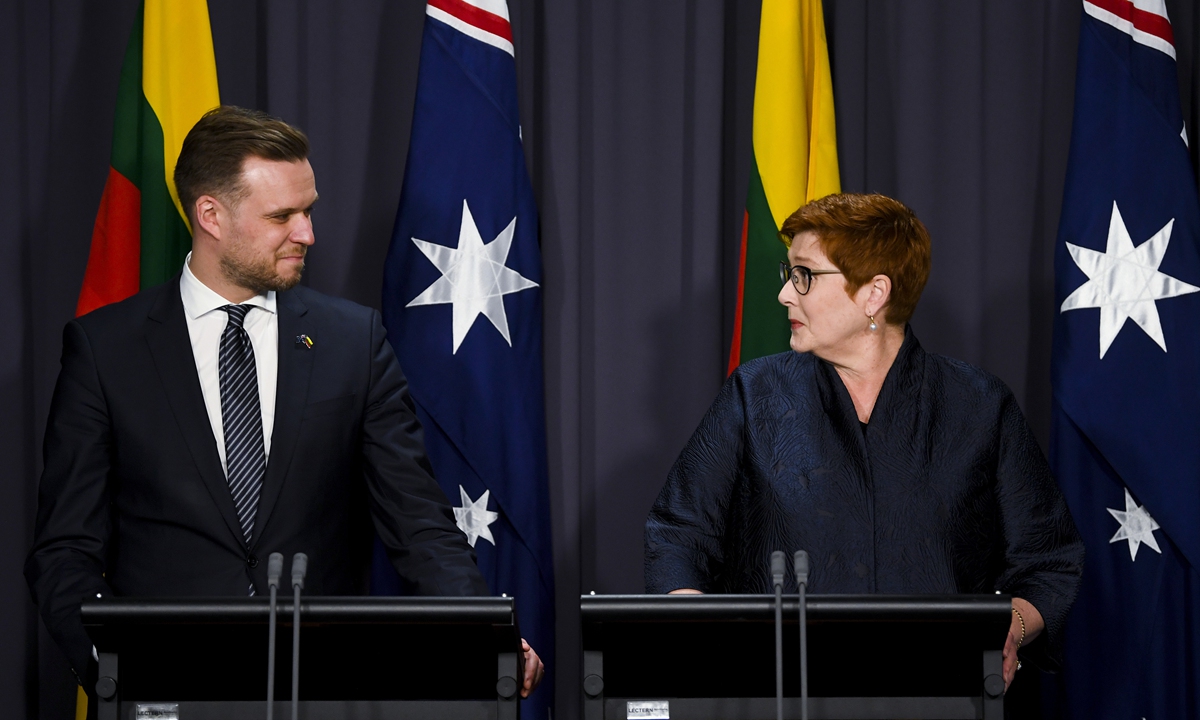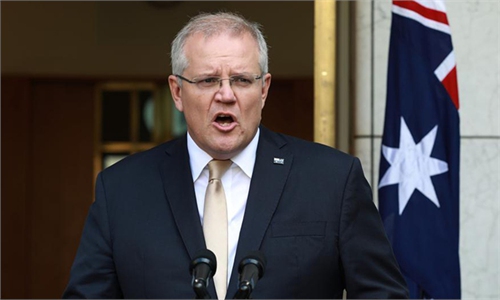
Australian Foreign Affairs Minister Marise Payne (right) and Lithuania's counterpart Gabrielius Landsbergis hold a press conference at Parliament House in Canberra, Australia on February 9, 2022. Photo: VCG
Lithuania's Foreign Minister Gabrielius Landsbergis visited Australia and met his counterpart Marise Payne on Wednesday. Before his visit, Landsbergis emphasized that Lithuania did not intend to offer a name change to the so-called "Taiwanese representative office" in Vilnius. During the meeting, the two foreign ministers agreed to step up cooperation on strategic challenges, "in particular pressures from China." However, Payne also noted that Australia is not looking at renaming the Taipei Economic and Cultural Office in Australia as Lithuania did last year. The country's insistence on a one-China principle is tantamount to pouring cold water on Landsbergis who visited Australia to seek support.
The Taiwan question is the political basis for other countries to establish and develop diplomatic relations with China. The one-China principle is a broad consensus held by the international community and is China's bottom line. There is no room to compromise. Payne is well aware of the importance and sensitivity of the Taiwan question to China-Australia relations, and understand the serious consequences Australia may incur if it follows what Lithuania did on the Taiwan question.
At the same time, it is clear to many countries, including Australia, that Lithuania's agreement to establish the so-called "Taiwanese representative office" in Vilnius is merely an attempt to demonstrate to the US its value in challenging China. The country's wrongdoing has provoked huge controversy and opposition in Lithuania. Even Lithuania's President Gitanas Nauseda said it was a "mistake."
Landsbergis' emphasis on not changing the name of the representative office is nothing but a branding for his personal political image at home. The foreign minister is one of the operators of this matter, and for politicians, there is no turning back. If Landsbergis changes his attitude on the issue of the name change, it will be a big blow to his domestic reputation.
Lithuania's unthinkable move on the Taiwan question may have been to test China's tolerance on the issue. The results of the test were seen by both Australia and the US.
Landsbergis believes that Lithuania, like Australia, has been subjected to so-called "economic coercion" by China, but the problems in China-Australia relations are very different from those in China-Lithuania relations. Lithuania has touched the red line of China, and the consequences have shown Australia the high sensitivity of the Taiwan question: already deteriorated China-Australia relations would be even more challenging if Australia were to cross the bottom line. The bitter consequences Lithuania has tasted in the aftermath of this matter have also left it without the backbone to ask Australia to be more aggressive on the issue of a name change.
In terms of trade, China is Australia's largest trading partner; in terms of geopolitics, both are Asia-Pacific countries that intersect in many international and regional affairs; and in terms of cultural exchanges, the two countries have close contact, with many Chinese students studying in Australia.
In contrast, the China-Lithuania relationship is far less significant to both sides than the China-Australia relationship. Lithuania is a tiny European country with a diplomatic focus and major trading partners in Europe, as well as a limited presence in the Asia-Pacific region. Its relations with China are also relatively simple, and trade between the two countries is quite limited. The essential difference between the two relationships is that Australia will not be so reckless on the Taiwan question.
Western media reports have hyped that Australia and Lithuania made a consensus on working together to maintain the international rules-based order, free and open trade, transparency, security and stability. On the one hand, such a statement is a political slogan. In terms of Lithuania's economic structure and trade network, most of its main trading partners are European countries, many of which are also its neighbors. Australia and even the Asia-Pacific region as a whole are of low importance in Lithuania's trade structure. It is difficult for a small economy like Lithuania to build a global network, and there is limited room for Australia and Lithuania to implement such a slogan.
On the other hand, in the current situation of China-Australia relations, the verbal support Australia offers Lithuania costs nothing. However, by emphasizing that Australia has no intention of being adventurous on the Taiwan question, the country shows to the world that it's quite clear about the red line in China-Australia relations, differentiating itself from Lithuania.
The author is an assistant research fellow at the China Institute of International Studies. opinion@globaltimes.com.cn

